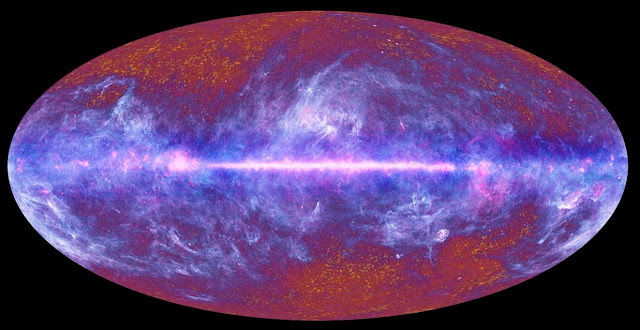The first image of the microwave sky was released today by the Planck collaboration. The image is the result of a year of observations from the Planck satellite. How far we have come since the first image of the cosmic microwave background by COBE! The most prominent aspect of the image is the bright band across sky caused by diffuse gas and dust emission from our own Milky Way. Also visible are local clouds of gas, nearby galaxies such as Andromeda, and more distant galaxies which host supermassive black holes in their center. The more subtle variations which will be visible when the foregrounds are removed are tiny temperature fluctuations which carry information about the cosmic microwave background and primordial density fluctuations seeded by the Big Bang. However, scientists are waiting to dive into detailed analysis of the multi-frequency data ranging from 30 GHz to 857 GHz until all of the foregrounds and telescope systematics can be understood. Ultimately the Planck data will give us the most precise constraints humans have ever had on the parameters of our cosmos.
Planck is a major step forward in cosmic microwave background (CMB) observations because it measures polarization of microwave photons. The polarization of photons may carry information about the universe from inflation or when the CMB was generated 400,000 years after the Big Bang. Generally when an electromagnetic wave or photon is incident upon a free electron the scattered photon is polarized perpendicularly to the incident direction. Different regions of the CMB may have a net linear polarization generated when radiation from perpendicular directions in the sky has different intensities. Different directions in the sky have different intensities dependent upon perturbations; there are three kinds of perturbations 1) scalar perturbations due to density fluctuations, 2) vector perturbations due to vorticity (like cosmic strings or defects, although these are not likely to be detected), 3) and tensor perturbations due to gravity waves. The Planck mission will be the first CMB space satellite to measure the as of yet unseen gravity wave or "B-mode" poarlization which will reveal the physics of primordial gravity waves when the Universe was in existence for just 10-36 seconds.
Field of Science
-
-
Change of address7 months ago in Variety of Life
-
Change of address7 months ago in Catalogue of Organisms
-
-
Earth Day: Pogo and our responsibility10 months ago in Doc Madhattan
-
What I Read 202411 months ago in Angry by Choice
-
I've moved to Substack. Come join me there.1 year ago in Genomics, Medicine, and Pseudoscience
-
-
-
-
Histological Evidence of Trauma in Dicynodont Tusks7 years ago in Chinleana
-
Posted: July 21, 2018 at 03:03PM7 years ago in Field Notes
-
Why doesn't all the GTA get taken up?7 years ago in RRResearch
-
-
Harnessing innate immunity to cure HIV9 years ago in Rule of 6ix
-
What kind of woman would pray for health or use spiritual healing?9 years ago in Epiphenom
-
-
-
-
-
-
post doc job opportunity on ribosome biochemistry!11 years ago in Protein Evolution and Other Musings
-
-
Blogging Microbes- Communicating Microbiology to Netizens11 years ago in Memoirs of a Defective Brain
-
Re-Blog: June Was 6th Warmest Globally11 years ago in The View from a Microbiologist
-
-
-
The Lure of the Obscure? Guest Post by Frank Stahl13 years ago in Sex, Genes & Evolution
-
-
Lab Rat Moving House14 years ago in Life of a Lab Rat
-
Goodbye FoS, thanks for all the laughs14 years ago in Disease Prone
-
-
Slideshow of NASA's Stardust-NExT Mission Comet Tempel 1 Flyby15 years ago in The Large Picture Blog
-
in The Biology Files
Subscribe to:
Post Comments (Atom)



















No comments:
Post a Comment
Markup Key:
- <b>bold</b> = bold
- <i>italic</i> = italic
- <a href="http://www.fieldofscience.com/">FoS</a> = FoS